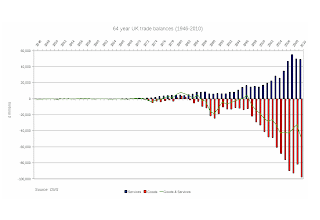Interest only mortgages increase
According to data released to the Telegraph by the FSA, between the onset of the financial crisis in the third quarter of 2007 and the final three months of last year, the value of interest-only mortgages increased by £99bn and the number of borrowers rose by 369,370. Some of these mortgages are new loans, but the FSA confirmed that the 'bulk' of them were refinancing from repayment mortgages to interest-only mortgages.
It appears that UK households are refinancing to a cheaper mortgage, but presumably without spending the additional money into a mortgage principal repayment vehicle, such as a pension or ISA. The FSA said, "more than 95pc of customers requesting a conversion to permanent interest-only terms were found to be in financial stress". This is a sign not only of contracting household income and rising expenses, but of the increasing unaffordability of mortgages held by those households. Mortgage repayments are progessively taking a larger and larger share of household income.
The shocking thing to note here is that mortgage rates are at 300 year lows, and the BoE rate near to zero. What is the position going to be in those households when mortgage rates return to more normal rates? One member (deputy governor) of the BoE has an answer - normal rates will never return, not for decades at least. Those of us who live in the real world know this is not true - even if the BoE wishes it. We haven't been told how many of these mortgages are variable and how many fixed, or for how long. So when mortgage interest rates rise to say 6%, 8%, 10% how many households will be unable to pay? Certainly all of those not fixed. They will have already stopped paying.
This data is a sign of future stress in the housing market. There are signs of stress in repayments everywhere, and this will lead to non-performing loans and then repossessions. Government intervention may reduce the impact, but eventually the banks will act. Unaffordable loans to existing borrowers will be reflected in unaffordable loans for new buyers - the household budget dynamics will be the same - it is an indicator that households are able to finance less than before, which will reduce their ability to take on credit.
On the other hand in some households (I'm guessing those who are employed by taxpayers) are repayment their mortgages more quickly, making overpayments. There is evidence here of a split economy, one part desparately short of cash, the other with surplus.
I'll just note that total credit from banks is being artificially sustained by this trend, and that banks are probably cooperating with households who are refinancing to interest-only because they cannot afford a repayment, knowing full well that the mortgagee has no other repayment plan in place.
It appears that UK households are refinancing to a cheaper mortgage, but presumably without spending the additional money into a mortgage principal repayment vehicle, such as a pension or ISA. The FSA said, "more than 95pc of customers requesting a conversion to permanent interest-only terms were found to be in financial stress". This is a sign not only of contracting household income and rising expenses, but of the increasing unaffordability of mortgages held by those households. Mortgage repayments are progessively taking a larger and larger share of household income.
The shocking thing to note here is that mortgage rates are at 300 year lows, and the BoE rate near to zero. What is the position going to be in those households when mortgage rates return to more normal rates? One member (deputy governor) of the BoE has an answer - normal rates will never return, not for decades at least. Those of us who live in the real world know this is not true - even if the BoE wishes it. We haven't been told how many of these mortgages are variable and how many fixed, or for how long. So when mortgage interest rates rise to say 6%, 8%, 10% how many households will be unable to pay? Certainly all of those not fixed. They will have already stopped paying.
This data is a sign of future stress in the housing market. There are signs of stress in repayments everywhere, and this will lead to non-performing loans and then repossessions. Government intervention may reduce the impact, but eventually the banks will act. Unaffordable loans to existing borrowers will be reflected in unaffordable loans for new buyers - the household budget dynamics will be the same - it is an indicator that households are able to finance less than before, which will reduce their ability to take on credit.
On the other hand in some households (I'm guessing those who are employed by taxpayers) are repayment their mortgages more quickly, making overpayments. There is evidence here of a split economy, one part desparately short of cash, the other with surplus.
I'll just note that total credit from banks is being artificially sustained by this trend, and that banks are probably cooperating with households who are refinancing to interest-only because they cannot afford a repayment, knowing full well that the mortgagee has no other repayment plan in place.


Comments
Post a Comment